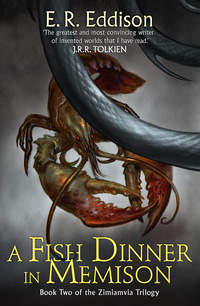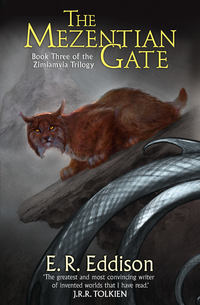
Полная версия
A Fish Dinner in Memison
Then, six months afterwards. Twenty-fourth of June. That river-party: that well planned, well timed, confident proposal: its rejection (a discomfiture in which he had not been singular; rather ninth or tenth; if talk were to be trusted). And, most devastating, something in the manner of her refusal: an Artemisian quality, quiver of startled hind, which stripped scales from his eyes to let him see her as never before: as the sole thing, suddenly, which as condition absolute of continuing he must have, let the world else go hang; and, in the same thunderclap, the one sole thing denied him. And so, that feverish fortnight, ending (thank heaven) with the best terms he might make (her cousin Jim Scarnside playing honest broker): burial of that black No, upon condition he should himself leave the country and not before fifteen months come back for his answer: eighteen months, as first propounded; which he would have shortened to August year (that is harvest time); but Mary would not give ground beyond Michaelmas: ‘An omen too, if you were wise – Vintage.’
Vintage. Vindemiatrix: she who harvests the grape: the delicate star in whose house the sun sits at autumn, and with her mild beams moderates his own to a more golden and more tranquil and more procreative radiance.
Nine months gone: Dahomey, Spain, Corsica. And April now: the twenty-second of April. A hundred and fifty-nine days to go.
The back arrowed swoop of the moment swung high into the unceilinged future, ten, fifty, sixty years, may be: then, past seeing, up to that warmthless unconsidered mock-time when nothing shall be left but the memorial that fits all (except, if there be, the most unhappiest) of human kind: I was not. I lived and loved. I am not. Then (or was it a bat, of the bats that hawked there between the piazza lamps and the stars?) it swung near, flashing darkly past that Dark Lady’s still mouth, at whose corner flickered a something: miraculously that which, asleep or awake, resided near the corner of Mary’s mouth.
Queen of Hearts: Queen of Spades: ‘Inglese Italianato’: the conflict of north and south in his blood; the blessing of that – of all – conflict. And yet, so easily degraded. As woman’s beauty, so easily degraded. The twoness in the heart of things: that rock that so many painters split on. Loathsome Renoir, with his sheep-like slack-mouthed simian-browed superfluities of female flesh: their stunted tapered fingers, puffy little hands, breasts and buttocks of a pneumatic doll, to frustrate all his magic of colour and glowing air. Toulouse-Lautrec, with his imagination fed from the stews, and his canvases all hot sweat and dead beer. Etty’s fine sensuality coarsely bitted and bridled by a convention from without, and starved so of the spirit that should have fed it to beauty from within. Burne-Jones’s beauties, nipped by some frost: Rossetti’s weighted with undigested matter: Beardsley, a whore-master, prostituting his lovely line to unlovely canker-buds. Even the great: even Titian in his Sacred and Profane Love, even Botticelli in his supreme Venus, were (he said in himself), by some meddling from within or without, restrained from the ultimate which I would have, and which as a painter I (Kapaneus’s




Yes. They die





All this in a few seconds of time: apocalyptically.
Lessingham answered her: ‘Signora, if I were God Omnipotent, I should be master of it. And, being master, I would not be carried by it like a tripper who takes a ticket for a cruise. I would land where I would; put in to what ports I liked, and out again when I would; speed it up where I would, or slow it down. I would wind it to my turn.’
‘That,’ she said, ‘would be a very complicated arrangement. One cannot deny it would be a pleasure. But the French precision, I fear, would scarcely apply itself so fitly, were that the state of things.’
‘You would hardly have me do otherwise?’
Slowly drawing off her right-hand glove, she smiled her secular smile. ‘I think, sir (in my present mood), that I would desire you, even so, to play the game according to its strict rules.’
‘O,’ said Lessingham. ‘And that (if it is permissible to enquire), in order to judge my skill? or my patience?’
Her fingers were busied about her little gold-meshed bag, finding a lira for her wine: Lessingham brought out a handful of coins, but she gracefully put aside his offer to pay for it. ‘I wonder?’ she said, looking down as she drew on her crimson glove again: ‘I wonder? Perhaps my answer is sufficient, sir, if I say – Because it amuses me.’ She rose. Lessingham rose too. ‘Is that sufficient?’ she said.
Lessingham made no reply. She was tall: Mary’s height to an inch as he looked down at her: incredible likenesses to Mary: little turns of neck or hand, certain looks of the eye, that matter of the mouth (a thing surely unknown before a living woman). Unlike Mary, she was dark: jet-black hair and a fair clear skin. ‘Good night, sir,’ she said, and held out her hand. As if bred up in that gracious foreign courtesy, he bowed: raised it to his lips. Strangely, be made no motion to follow her; only as she turned away, watched her gait and carriage, inhumanly beautiful, till she was vanished among the crowd. Then he put on his hat again and slowly sat down again at his table.
So he sat, half an hour more, may be: a spectator: looking at faces, imagining, playing with his imaginations: a feeling of freedom in his veins: that strange glitter of a town at night, offering boundless possibilities. In that inward-dreaming mood he was unconscious of the clouding over of the stars and the closeness of the air, until rain had begun in big drops and the whole sky was split with lightning which unleashed the loud pealing thunder. Hastening back drenched to his hotel with collar turned up and with the downpour splashing again in a million jets from the flooded pavement, he, as in a sudden intolerable hunger, said in himself: ‘It is long enough: I will not wait five months. Home tomorrow.’
She, in the mean while (if, indeed, as between World and World it is legitimate to speak of ‘before’ and ‘after’), had, in a dozen paces after Lessingham’s far-drawn gaze had lost her, stepped from natural present April into natural present June – from that night-life of Verona out by a colonnade of cool purple sandstone onto a daisied lawn, under the reverberant white splendour of midsummer noonday.
II
MEMISON: KING MEZENTIUS
COMING now beyond the lawn, that lady paused at the lily-pond under a shade of poplar-trees: paused to look down for a minute into depths out of which, framed between the crimson lilies and the golden, looked up at her, her own mirrored face. The curves of her nostrils hardened: some primal antiquity seemed suddenly to inform the whole presence of her, as if this youth and high summer-season of her girlhood were, in her, no season at all: not a condition, bearing in its own self its own destiny to depart and make place for future ripenesses, of full bloom, fading and decay; but a state unchanging and eternal. Her throat: her arm: the line of her hair, strained back from the temples to that interweaving of darkness with sleek-limbed darkness, coiled, locked, and overlaid, in the nape of her neck: the upward growth there, daintily ordered as black pencillings on the white wings of a flower-delice, of tiny silken hairs shading the white skin; her lips, crystal-cold of aspect, clear cut, red like blood, showing the merest thread-like glint of teeth between; these things seemed to take on a perfection terrible, because timeless.
The lord Chancellor Beroald, from his seat beneath an arbour of honeysuckle leftwards some distance from where she stood, watched her unseen. In his look was nothing of that worship, which in dumb nature seemed: rather an appraising irony which, setting profession beside performance, fact beside seeming, sucks from their antic steps not present entertainment only, but knowledge that settles to power.
‘Is your husband in the palace?’ he said presently.
‘How should I know?’
‘I had thought you had come that way.’
‘Yes. But scarcely from taking an inventory.’
‘Ha, so there the wind sits?’
He stood up as she came towards him, and they faced each other in silence. Then, light as the stirring of air in the overarching roof of poplar leaves above them, she laughed: held out a hand to him, which he after a pause dutifully, and with some faint spice of irony to sauce the motion, kissed;
‘Your ladyship has some private jest?’
She sat down, elegantly settling herself on the rose-coloured marble bench, and elegantly drawing down, to smell to, a spray of honeysuckle. The black lashes veiled her eyes, as she inhaled from eight little branching horns of crimson, apricot-gold, and creamy colour, the honeysuckle’s sweetness. Then, letting go the trailing flower, she looked round at him sitting now beside her. ‘I was diverted,’ she said, ‘by your look, my noble brother. That look you had, I remember, when you enveigled me to fall in with your pretty plan touching my former husband.’
‘As we mount the hill,’ said the Chancellor, ‘the prospect opens more large. That was beginnings.’
‘O, I spoke not of beginnings: not with that Borgian look. Piazza steps in Krestenaya.’
‘Leave this talk,’ said the Chancellor.
‘Having yourself, before, fobbed him off on me like a base coin, to serve your own turn,’ said she; ‘and, soon as well rid of him, teased me to taking of this Morville: so much the better alliance for you, as being by some distant removes able to claim kinship with the Parrys. You think, I suppose, that, holding in me the Queen of Spades, you shall always be able to command the Ace to take knaves with?’
‘Fie, sister!’
‘Fie, brother! And you shall see, I’ll play cards for love, not for policy. And next time you shall need to play me the King of Hearts, to be worth my Ace to trump him.’
‘What’s this?’ said the King behind them: ‘chancellors with kings i’ their hands? That was ever ruin, sure, whether to him that held or him that was holden.’
‘Serene highness,’ said the Chancellor, rising and turning about to face his master: ‘you do know me: I ne’er play cards.’
The King laughed. ‘Nor I: save now and then with the Devil; and that’s now and then both good and needful.’ Well six foot tall stood the Chancellor, clean of build and soldier-like; but the King, in black-bearded majesty, with eagle eyes, from under his black bonnet plumed with black eagle’s feathers, looked down to him. The Duchess of Memison on the King’s arm was as the beauty of an autumn evening leaning on night: a beauty of clouds and fire, of red-gold effulgence of sunset shining low through pine-tops and fern-fronds, when a little mist steals along the hillside and homing wild-duck stream high against the west. That Dark Lady, still seated, still with her back towards them, had but reached a jewelled hand to the honeysuckle to draw it down again to smell to.
‘My Lady Fiorinda.’
She turned, saw, and rose, all duty and obedience, yet with the self-ordered unhasting haste of a foam-footed wave of the sea in calm June weather. ‘Your gentle pardon, not to have known your highness’ voice. Madam, your grace’s humble servant.’
‘I have pardoned worse than that,’ said the King, ‘in a Valkyrie.’
‘In a Valkyrie? Am I that?’
‘Answer her, madam.’
‘O,’ said the Duchess, ‘she is none of mine. Let her answer for herself.’
‘None of yours? and in lovely Memison? where the very birds do fly to you at your becking? By whose doing but by yours should I have met her this morning, on a white horse, galloping, at the first spring of day as I rode up through your oak-groves.’
‘As to speak of Valkyries,’ said Fiorinda: ‘I had supposed rather that your highness thought my horse had ta’en command of me: so swift as you rode me down and had him by the bridle.’
The King met her eyes, green and hard. ‘It is best way,’ he said, ‘with a Valkyrie: safer treat Goddess as woman than woman as Goddess. And, as to speak of pardon: tell me not, mistress! You knew. And studied so to sit on: note whether I’d call you.’
She stood silent, looking down, as a statue unconcerned save that from the faint lifting, like the wings of a sea-swallow in flight, of her slender black eye-brows and from some subtle change about her mouth, there seemed to be shed about her a coldness as of the waste between the worlds.
‘I have procured a place for you,’ said the King: ‘lady of the bedchamber to the Duchess. Will you thank me for it?’
She looked up, and first at the Duchess. ‘I’ll thank both, and offend none. And, so please your serenity, I’ll ask my husband’s leave first.’
‘No need,’ said the King. ‘That’s asked and given this hour since. And now attend me, Beroald.’ He said apart to the Duchess, looking into her green eyes across her fingers as he raised her hand to his lips, ‘You see, madonna: I will do your way.’
‘The Chancellor? O I am glad,’ said she, and it was as if some benediction came and went like a breath of honeysuckle among common garden sweetnesses.
‘Then, ladies, give us leave for an hour. ’Fore God, matters of state, here in Memison, serve as salt pilchards and fumadoes ’twixt the wines, lest too much sweetness quite cloy us. Even as lovely Memison and your dear acquaintance, madam, are my noonday shadow and greenery in the desert of great action.’
‘And yourself,’ said the Duchess, ‘Lord of us and all; and yet slave yourself to that same desert.’
‘Of one thing only, in earth or heaven, am I slave.’
‘And ’tis?’
‘Of my own self will,’ said the King, laughing at her. ‘Come Chancellor.’
They two walked away slowly, over the lawn and through under that colonnade to another lawn, a hundred and fifty paces in length, may be, and forty across, with the long eastward-facing wall of the castle to bound it on the further side. Fair in the midst of that lawn they now began to pace the full length of it back and forth with slow and deliberate strides; and whiles they talked, whiles they seemed, falling silent, to weigh the matter. Low was their talk, and in that open sun-smitten place no danger of eavesdropping; unless the blackbird that hopped before them, jerking his tail, should listen and understand their discourse; or the martin, skimming to and fro in flashes of black and silver, still coming and returning again to her nest in the colonnade.
‘I have eggs on the spit, Beroald.’
‘I know,’ said the Chancellor, very soberly.
‘How should you know? I never told you.’
‘I can smell them, even through this air of lilies.’
‘Beroald, I have resolved to employ you in a matter I did mean, until this morning, none should have hand in but myself only. Am I well advised, think you?’
‘If your serenity mean, well advised in undertaking of the thing, how can I answer, knowing not for certain what it is?’
‘I mean,’ said the King, and there was a tartness in his voice, ‘is it well advised to open, even to you, a business of so much peril and import?’
The Chancellor paused. Then, ‘That is a question,’ he said, ‘my Lord the King, that neither you nor I can answer. The event only can answer it.’
‘You say, then, the event must show whether I be a fool to trust you? Whether you be, as I think, a man of mettle, and a man of judgement, and my man?’
‘Your highness hath spoke my thought with your own mouth.’
‘As cold as that?’
‘Well, there is this besides,’ said the Chancellor: ‘that you were always my furtherer; and I, having looked on this world for five times seven years, have learnt this much of wisdom, to “bow to the bush I get bield frae”.’
‘A fair-weather friend could say that,’ said the King, searching his face. ‘But we are to put into a sea we cannot sound.’
The Chancellor replied, ‘I can say no more; save that, if this be action indeed, as your highness (as I have ever known you) counteth action, then, choosing me or any other man, you have but a weak staff to lean unto.’
‘Enough. Beroald, my eye is on the Parry.’
‘So are lesser eyes.’
‘These four years.’
‘Since his crushing for you of Valero’s rebellion in the March of Ulba. You have taken your time.’
‘I would let him run on in his course of spending.’
‘Yet remember,’ said the Chancellor, ‘his policy is that of the duck: above water, idle and scarce seen to stir; but under water, secretly and speedily swimming towards his purpose.’
The King said, ‘I know an otter shall pluck down yonder duck by the foot when least she doubts it.’
‘It will need civil war now to bring him in.’
‘He is my Vicar in Rerek. Will it not argue a feeble statecraft if I, that have reigned twenty-five years in troubles and disquietudes, cannot now command my own officer without I make war against him?’
‘Your serenity may have information we know not of. But most certain it is that, ever since the overthrow of those attempts in the Marches made him higher crested, he hath used your royal commission as his grappling-iron to grapple to his private allegiance the whole mid kingdom ’twixt Megra and the Zenner. I say not he meaneth openly to outbeard the sovereign himself. I think not so. But waiteth his time.’
They took a turn in silence. Then said the King, letting his right fore-arm, that had lain loosely about the Lord Beroald’s neck, slip back till the hand shut strong upon his shoulder: ‘You remember we lately found a league in hand ’mongst some discontented spirits in Rerek and the Marches, which practice, though the branches on’t were easily cut off, yet was it thought to have a more dangerous and secret root. I myself have since, by divers ways, as many lines meet in the dial’s centre, come nearer to the truth. There be five or six, instruments of his: names, were I to name ’em you’d ne’er believe me: so many showing friends, so many unshowing enemies. I have letters, enough to satisfy me. Advise me: what shall I do?’
‘Summon them before you, himself and all, and let them answer the matter. If their answer be not sufficient, take off their heads.’
‘What? When the cry “Puss, puss, where art thou?” were next way to fright ’em to open rebellion? Mend your counsel, my lord Chancellor: this serves not.’
‘Serene highness, I am a man of law, and should meddle no further than my commission. Yet is it the platform and understanding of all law that the King, just cause arising, may lawfully act without the law? You are our great pilot, on whom all we cast our eyes and seek our safety. For security of your person, it were good this Vicar were made away. This then is my counsel: assure yourself well of your forces, and, that done, strike: and at unawares.’
The King laughed in his great black beard. ‘You have confirmed my very resolve, and so shall it be. But with two provisoes. First, I’ll not, like an unskilful boor, kill my good hawk ’cause she turns haggard: I’ll tame my Horius Parry, not end him.’
‘I’m sorry, then,’ said the Chancellor. ‘He is a buzzard: he is of bad carry: you can make him do nothing.’
‘Who are you, to prescribe and measure my ability?’
‘It should not be for my honesty to flatter you. Moreover, your highness hath proved him a man that neither believeth anything that another man speaketh, nor speaketh anything himself worthy to be believed.’
‘I say to you,’ said the King, ‘I’ll bring him to lure. As some reclaim ravens, kestrels, pies, what not, and man them for their pleasure, have I not so used him as my own these years and years? I would not lose him for twice the purchase of that dominion he holdeth for me.’
Beroald said, ‘If my words be too thin to carry so tough a matter, let your serene highness be advised further: require of my lord Admiral, or Earl Roder, or old Bodenay, your knight marshall in Rialmar, their opinions; or your tributary princes in north Rerek: they’ll say the same.’
But the King answered him, ‘Not all of you, Beroald, on your bended knees, nor all my liege subjects up and down the Three Kingdoms, might move me in this. Besides,’ he said, halting and turning to look Beroald in the eye, ‘(and here’s second proviso): to be King, as I have ever opinioned and ever set my course according, should be by competency, not by privilege. If I of myself be not competent of this thing to perform it, better goodnight then and a new king i’ the land.
‘Hearken, therefore, and note it well. ’Twas not by chance I guested with him in Laimak two weeks since in such loving-kindness, in my progress, and well forced; nor by chance that I removed thence with great show of pomp south hither into Meszria. It was to lull them. For all this I did, knowing secretly that he is to meet one night, in some convenient place remote among the upper waters of the Zenner, with five or six (the same I spoke on), there to complete and make up their plot for seizing of Rerek to be a kingdom of itself, with him king thereof. Of time, place, and other particulars of this meeting set, I expect information hourly. You and I, we two alone, will keep that tryst with ’em: wherein if I bring not the rest to destruction and him to his obedience, at least I’ll die attempting it.
‘Well? Will you go, or bide behind?’






